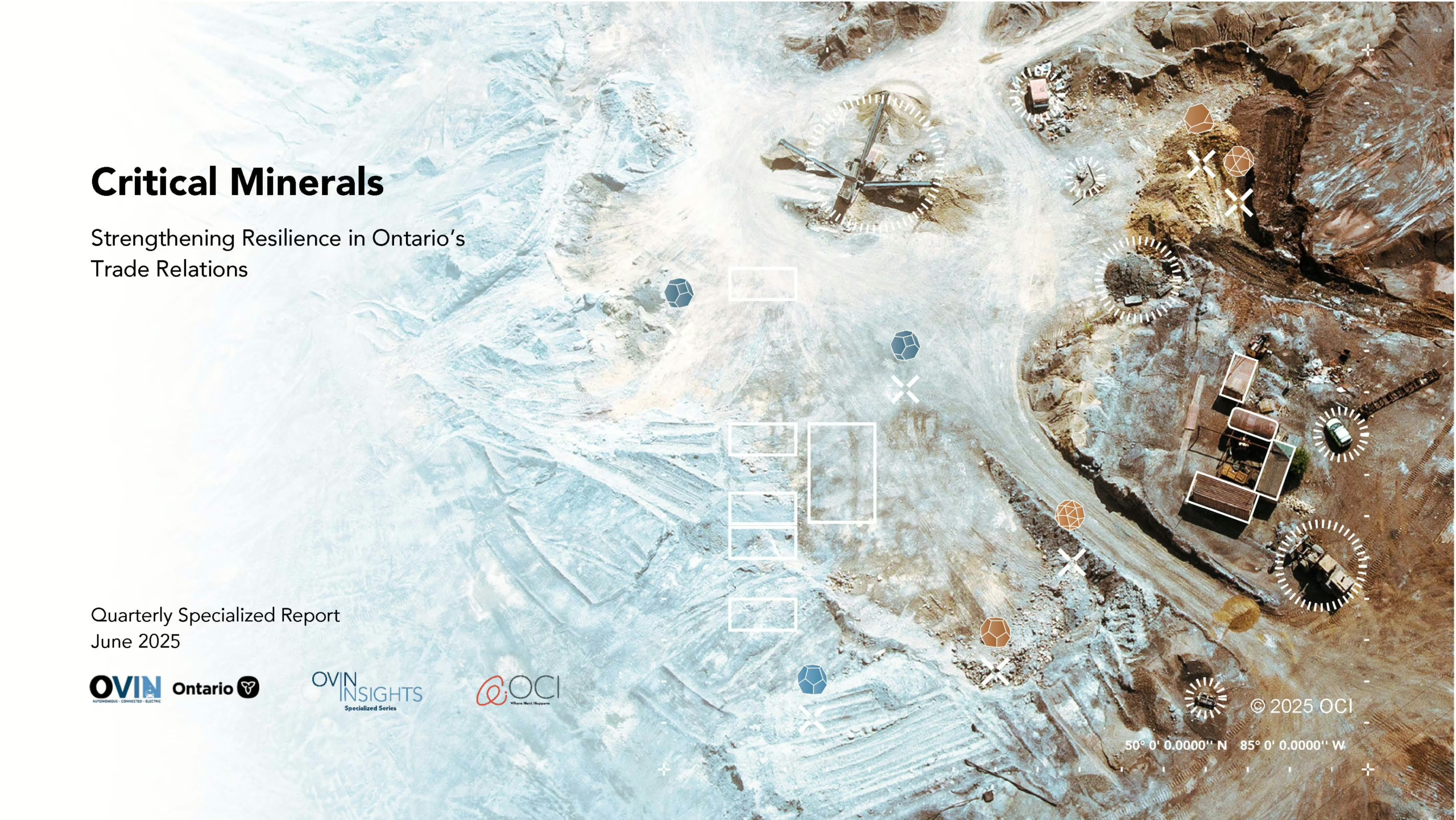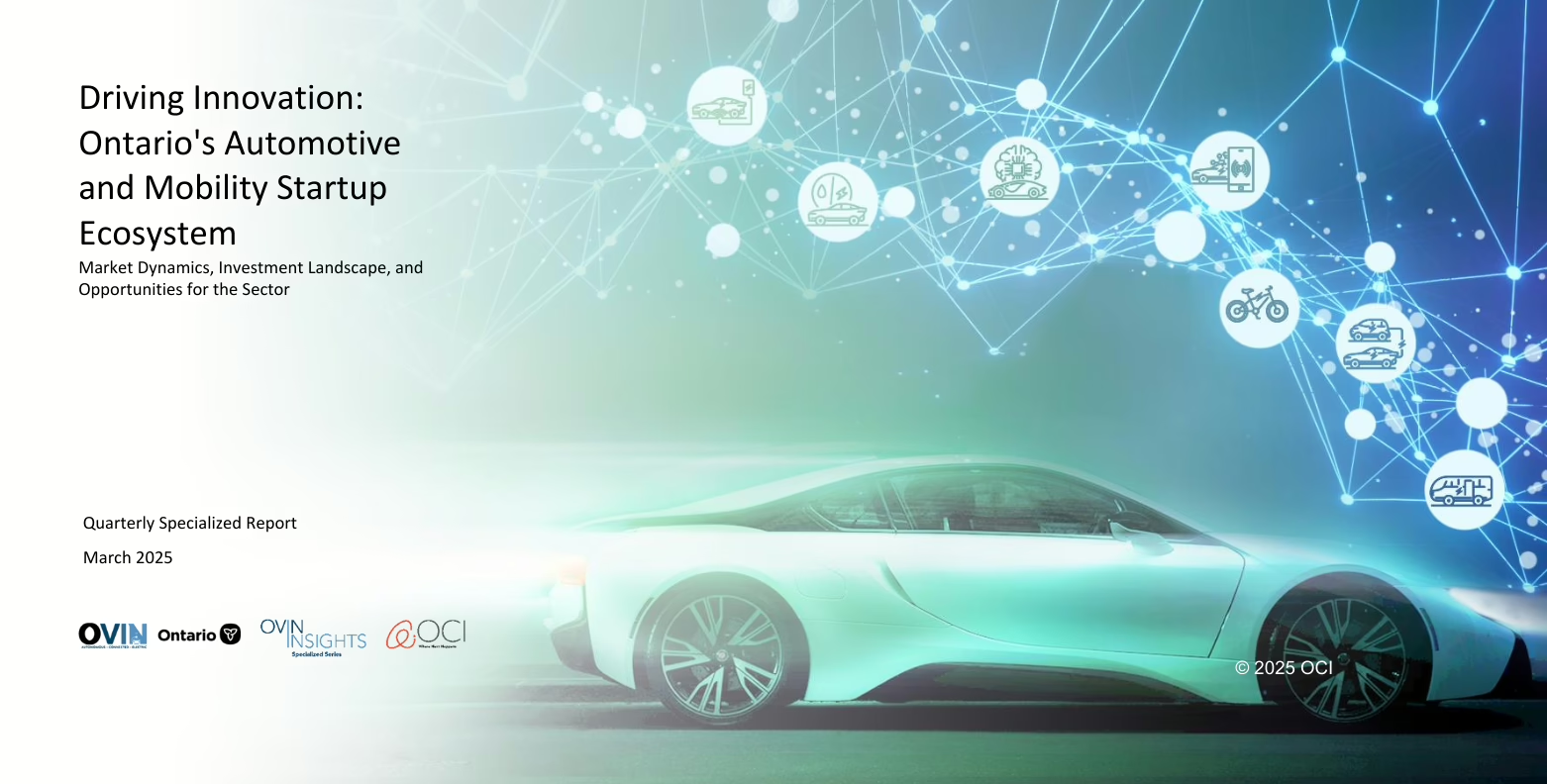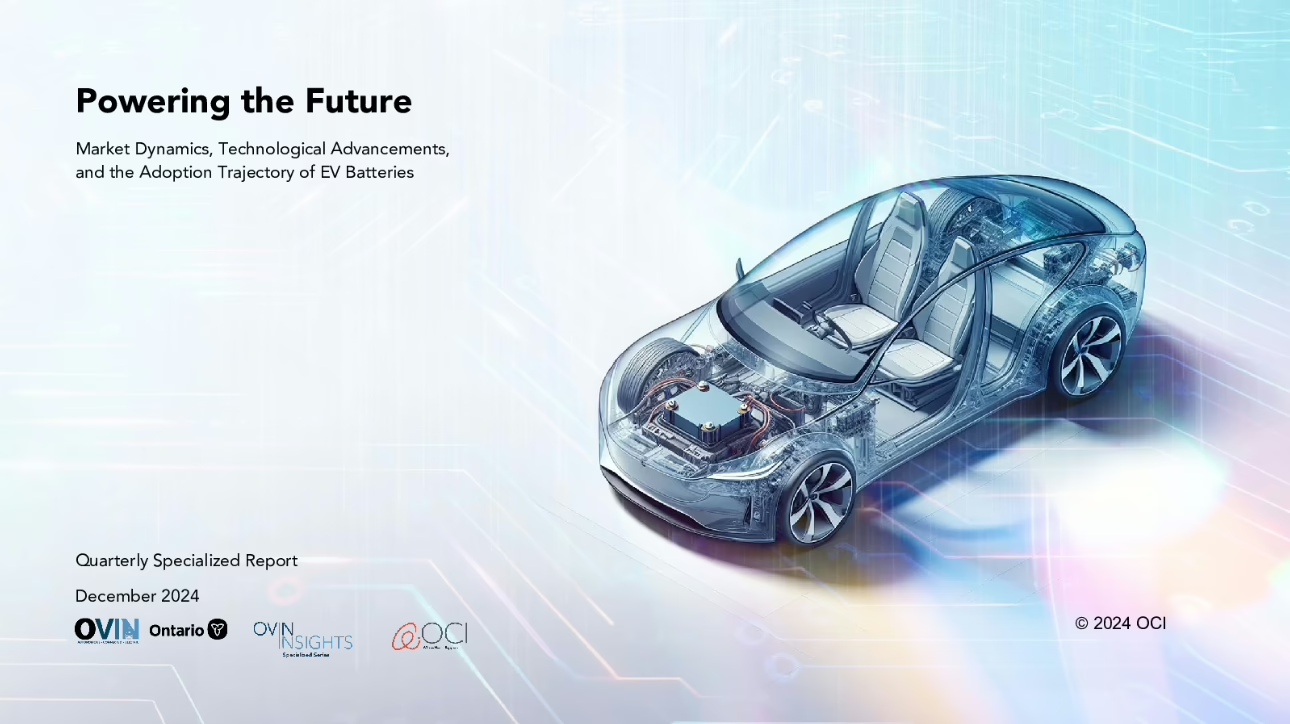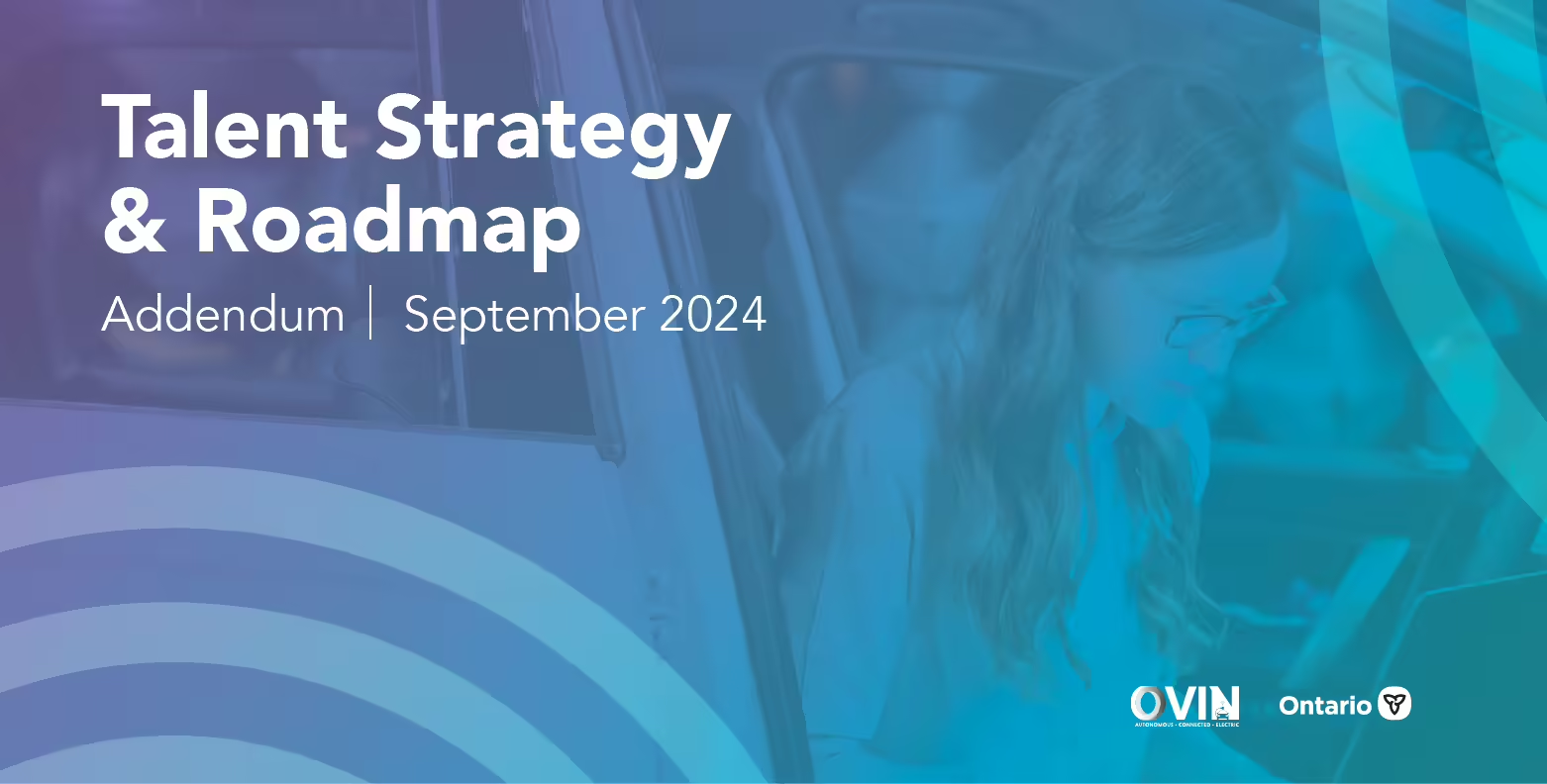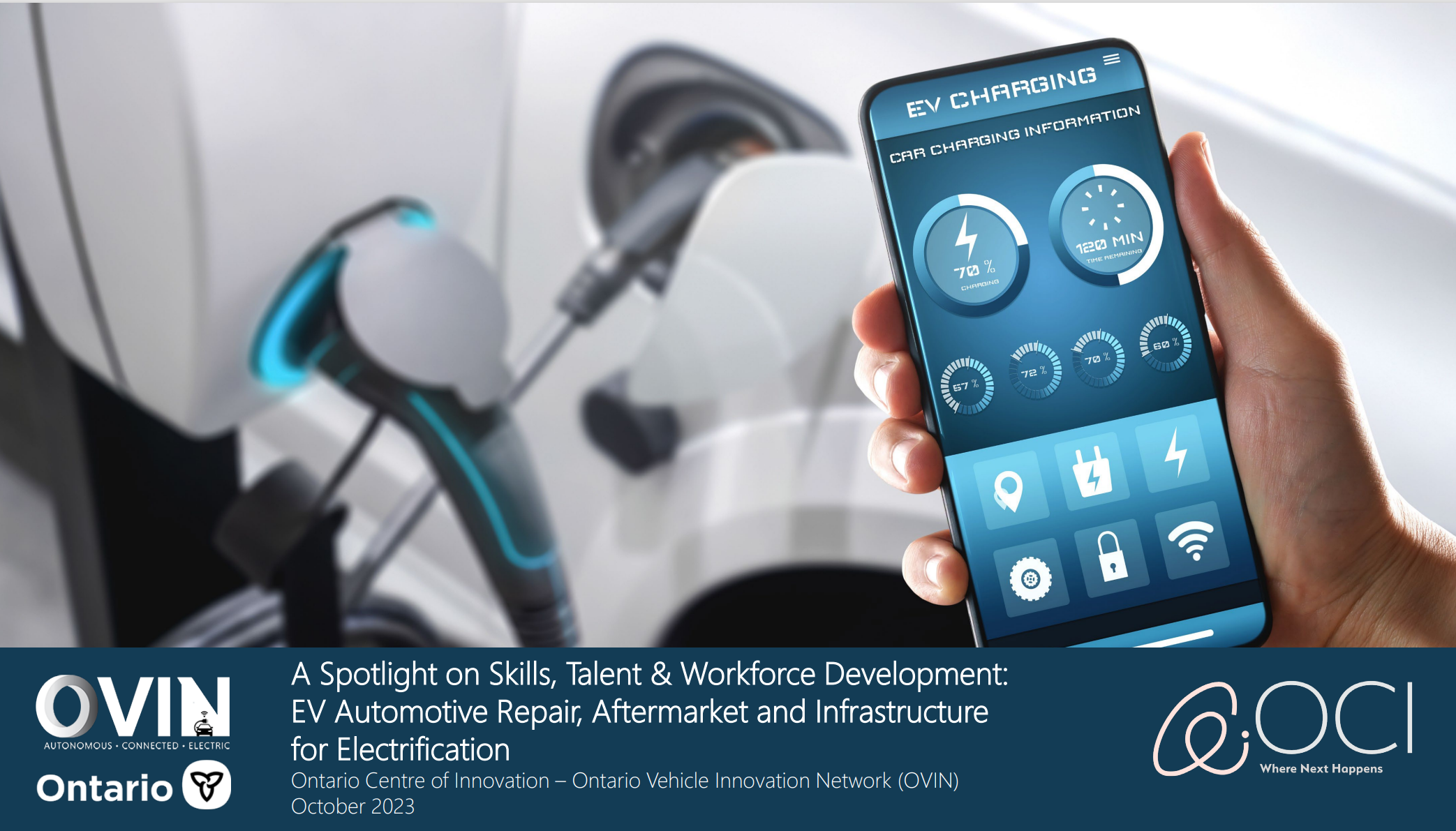Reports
Get in-depth insights into the automotive and mobility sectors with OVIN’s reports.

OVIN Reports
-

Critical Minerals: Strengthening Resilience in Ontario’s Trade Relations
This report analyzes Ontario’s critical minerals sector through research and expert interviews, focusing on economic impact, strategic advantages, and future opportunities.
-

Driving Innovation: Ontario’s Automotive and Mobility Startup Ecosystem
Ontario’s automotive startup ecosystem is flourishing, driven by a focus on cutting-edge technologies such as EVs, automated driving, and sustainable transportation. This vibrant ecosystem is supported by a network of companies advancing vehicle connectivity, cybersecurity, and manufacturing, with government incentives and funding opportunities further fueling growth. With a collaborative environment and access to top-tier resources, Ontario is an ideal destination for automotive startups to innovate and lead the future of mobility.
-

Powering the Future Market Dynamics of EV Batteries
Worldwide, the demand for electric vehicle (EV) batteries rapidly increased in recent years as consumers and industries increasingly adopted sustainable transportation solutions. More than one in five cars sold worldwide in 2024 are expected to be electric, and battery manufacturing capacity is expected to exceed 9 terawatt hours (TWh) by 2030, growing from 2.5 TWh in 2023.
-

Talent Strategy & Roadmap Addendum
Ontario continues to shape the future of the global automotive and mobility industry, attracting significant investment and driving innovation across the sector. OVIN is taking the lead by introducing cutting-edge talent attraction, retention, and workforce development initiatives designed to strengthen Ontario’s position on the global stage. These initiatives are not just about meeting today’s needs but about future-proofing Ontario’s workforce to ensure long-term sustainability and resilience.
-

Unlocking Semiconductor Potential in Ontario
Semiconductors are the foundation of modern technology, powering a wide range of devices from smartphones to cutting- edge medical equipment, and fueling innovation across nearly every industry.
-

Talent Strategy for the Critical Minerals Sector in Ontario – Strategic and Insights Policy Report
This report summarizes the key strategic and policy insights of a larger analysis based on three scenarios regarding the long-term jobs and skills needs of Ontario’s critical minerals sector.
-

Talent Strategy for the Critical Minerals Sector in Ontario
As we charge forward to an electric future, the Critical Minerals Talent Strategy will serve as the foundation for engaging talent, advancing training and education programs, promoting meaningful engagement of women and other underrepresented groups in the sector, and establishing long-term trust and partnership with Indigenous communities. Together, these approaches support Ontario’s vision of a future-ready workforce primed to lead the automotive and mobility sector globally.
-

Engine of Growth: Ontario’s Automotive Sector
Ontario is the backbone of Canada’s automotive industry supported by a robust ecosystem encompassing raw materials mining and refining, battery manufacturing and recycling, parts production, vehicle assembly, research and development, skilled workforce, and substantial investment and policy support from the Ontario Government.
-

Ontario’s Automotive Sector: Economic Contribution and Key Players
This report, which has been developed in collaboration with Global Automakers of Canada, presents an overview of Ontario’s automotive sector, including it’s contributions to the economy, trade and employment. It also provides a summary of the automotive ecosystem, outlining key locations, investments, and actors, including high-level profiles of each of the OEMs operating in the province.
-

Leading the Charge: Ontario’s Leadership in EV Charging Innovation
The electric vehicle (EV) charging industry has expanded rapidly in recent years, along with global ambitions to decarbonize the transport sector. EV chargers are essential to the development of the EV market – without sufficient charging infrastructure, the electrification of transport would not be able to keep pace with demand. This global expansion is pushing technological innovations, with EV charging organizations exploring opportunities for faster charging, wireless charging, and smart charging, and looking at how charging solutions can unlock opportunities for the sector.
-

Ontario’s Unique Position: Hardware Electronics and Semiconductors and Their Role in the Automotive and Mobility Sector
Ontario is uniquely positioned to be a central player in the semiconductor supply chain. The province is home to sought-after technical expertise and key industrial dependencies in automotive and advanced manufacturing. Ontario can play a leading role in the semiconductor space through its robust automotive sector, providing the link between chip manufacturing, EVs, and advanced automotive and mobility technologies.
-

A Spotlight on Skills, Talent & Workforce Development: EV Automotive Repair, Aftermarket and Infrastructure for Electrification
EV infrastructure, aftermarket and repair are the fourth and fifth stages of the automotive Electrification value chain and include the installation and maintenance of specialized infrastructure geared towards EVs, including grid planning/assessment, charging stations as well as servicing for EVs after they have been sold to the final user.
External Reports
-

Unlocking Semiconductor Potential in Ontario
Semiconductors are the foundation of modern technology, powering a wide range of devices from smartphones to cutting- edge medical equipment, and fueling innovation across nearly every industry.
-

Engine of Growth: Ontario’s Automotive Sector
Ontario is the backbone of Canada’s automotive industry supported by a robust ecosystem encompassing raw materials mining and refining, battery manufacturing and recycling, parts production, vehicle assembly, research and development, skilled workforce, and substantial investment and policy support from the Ontario Government.
-

Ontario’s Automotive Sector: Economic Contribution and Key Players
This report, which has been developed in collaboration with Global Automakers of Canada, presents an overview of Ontario’s automotive sector, including it’s contributions to the economy, trade and employment. It also provides a summary of the automotive ecosystem, outlining key locations, investments, and actors, including high-level profiles of each of the OEMs operating in the province.
-

The Impact of COVID-19 on Future Mobility Solutions
As the global pandemic spreads, mobility players need to prepare for the new world ahead.
-
Canada’s automotive future: Next-generation vehicles will change the industry as we know it
The global auto industry is heading toward a transformation – and the wide-ranging changes are well underway. In the next five years, production of electrically powered vehicles by all major original equipment manufacturers (OEMs) will rapidly accelerate, as well the advancement of autonomous features.
-
Industry 4.0 in automotive: Digitizing the end-to-end automotive value chain.
To encourage consumer update of advanced vehicle technologies, the automotive ecosystem still has some work to do, including figuring out just who will build and pay fro electric vehicle charging infrastructure.
-
Location, location, location in a mobile future.
The new mobility ecosystem involves transporting people and food from point A to point B in different ways. And that means profound impacts on the uses – and value – of real estate: points A, B, and everything in between.
-
The case for an end-to-end automotive-software platform
Software is transforming car capabilities but also creating development challenges for automotive players. An end-to-end approach that integrates independent software elements into a comprehensive platform can improve functionality and decrease complexity.
-
The Future of the Last-Mile Ecosystem
The aim of our advanced analytics-based congestion simulation and quantitative modelling is to inform last-mile ecosystem players’ strategy discussions through a solid fact base, to encourage public-private partnerships and to accelerate the development and implementation of effective interventions.
-
Testing is Critical for Adoption of Autonomous Vehicles
The autonomous vehicle combines various connected car technologies such as sensors, computers, and software which need rigorous testing to ensure conformance to safety and performance standards.
-
The Future of Mobility is at our Doorstep
What mattered in the automotive and mobility markets in 2019, and what will dominate the space in 2020? We look closer at the autonomous, connected, electrified, and shared trends that matter.
-
Activating a Seamless Integrated Mobility System (SIMSystem): Insights into Leading Global Practices
The World Economic Forum and Deloitte Consulting set out to define how such a seamless integrated mobility system might function and help address pressing mobility challenges.

